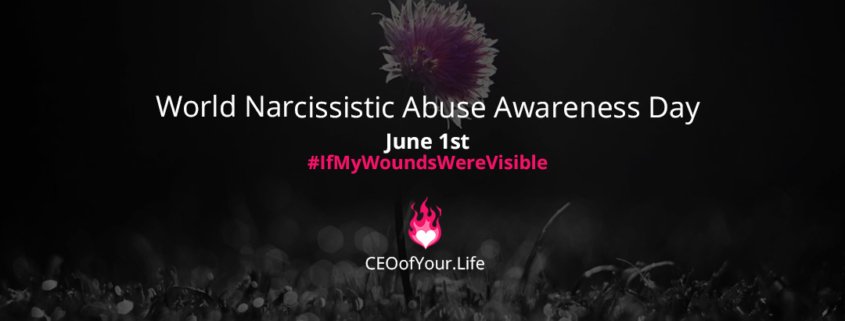How to Identify and Handle a Narcissist
June 1st is World Narcissistic Abuse Awareness Day. It is a day with a special place in my heart.
It was only this past year that I became aware of what a narcissist is and how to handle them. You see, I was surrounded by narcissists all my life and did not even know it. The abuse inflicted by a narcissist is insidious and hard to pinpoint. Often, the abuser acts like they are the only person with your best interests at heart, that they are the only person who truly cares for you, making it extremely difficult to see the abuse for what it is.
Narcissism is a personality disorder characterized by an inflated sense of self-importance, a need for admiration and a lack of empathy. People with this disorder are masters of manipulation, changing their personality according to whatever brings the attention they seek, whatever makes them look good in the eyes of the public.
While it is a recognized disorder, it is the target of the narcissist who suffers most.
You see, the flip side of narcissism is narcissistic abuse.
Narcissistic abuse is recognized as a form of psychological abuse and, by its nature, leaves no physical marks. Yet its effects are life altering and deeply felt.
Emotional manipulation is the core of this type of abuse, as the abuser aims to control the thoughts and actions of others. They do this through:
- Transferring fault – they do something wrong and turn it around to be your fault
- Gaslighting – making you doubt or question your perception of reality
- Verbal abuse – belittling, criticising, shaming or other verbal bullying
- Withholding – love, money, sex, safety, communication or affection
- Emotional blackmail – guilt trips, threats or intimidation
- Competition – constantly “one-upping” you or comparing you and pitting you against others
- Invasions of privacy – going through your things, ignoring boundaries, stalking or following, denying physical or digital privacy
- Dog-whistling – public comments that seem neutral to others, but are known to be offensive, critical or shameful to their target
These are just a few of the tactics an abuser may engage in. They may even use only one. The defining element is that it is consistent behaviour that, over time, breaks down your self worth, making you feel that you need your abuser; that you are not capable of functioning on your own.
When a parent, relative, friend, teacher, colleague, manager, medical professional or other person in your life consistently engages in this behaviour, that is abuse.
What can you do?
The first step is recognizing it. The second is seeking outside help to support you in rebuilding your self-esteem, accepting the relationship for what it is and setting boundaries. It may be best to get support from someone who has been through it and overcome it, because it’s something very hard to truly understand if you have not been a victim of it.
The narcissist in your life may be someone you wish you could have a loving relationship with. It could be a parent, a sibling, someone truly meaningful to you. What’s important is recognizing that the relationship is what it is, and you cannot change it. This person can never be the person you would like them to be. This person is not capable of loving you unconditionally or recognizing your feelings.
This can be very difficult to let go of. You may need time to grieve the relationship you wanted.
Remember, you cannot change the relationship. You can only change the way you respond to it.
Your support person or group can help you become aware of the abuse and how much it is impacting you. Since they are not directly part of your abuse, they can see it more clearly. Often, victims are so poisoned by this cloud of smoke that they do not realize the extent of the abuse and its impact. They typically downplay it, thinking there is something wrong with them.
You need to take a step back and determine what boundaries to set in order to live the life you deserve; a life that feels good for you.
Healthy boundaries are kryptonite to a narcissist. Expect them to react negatively. They don’t like boundaries, but do enjoy the challenge of them. They will try to convince you that you are harming yourself with your boundaries. Or they may make you feel guilty for setting them, saying something like, “How can you be so inconsiderate? You are hurting me. You are so selfish.”
Regardless of how they react, do not go back on the boundaries you know are good for you.
Remember, you are only responsible for yourself, your intentions, your life and your feelings. You are not responsible for the narcissist’s reactions. They are choosing how they respond.
Once you have acknowledged the abuse, accepted the reality of the relationship and determined your boundaries, now you need to decide how to handle the narcissist.
Here are two ways:
1- Go no contact
When you realize a person is truly narcissistic – all they want is control over you, to have their way, to disregard your feelings and choices and have no intention of changing – you may choose to end the relationship. Why keep playing small to make others happy at the expense of your health, your wellbeing and your dreams? You will never be able to reach your true potential staying in a narcissistic environment.
Keep in mind: “Do not correct a fool, or he will hate you. Correct a wise man and he will appreciate you.” If you try to discuss it with them and they still don’t ‘get it’ (a narcissist will never get it because it’s all about them), if they continually sap your energy, are toxic or manipulative, you can choose to end it. The more conversations you have with them, the more they will try to manipulate you, make you the crazy one and make you feel inadequate without them. Cut them out completely. Remove them from your contacts, block them from your phone, social media and everything. Remove the poisonous smoke.

Set a deadline for yourself to ensure you take action swiftly. Where negative relationships and narcissists are concerned, the sooner the better. You can only start to breathe fresh air when you are out of that toxic, narcissistic smoke.
Sometimes you can’t go no contact. You might have a child with a narcissistic ex, or it could be a co-worker, a neighbor or someone you see at family events. In that case, you may choose the…
2- Gray rock approach
Be like a gray rock and the narcissist will eventually lose interest in you.
A boring gray rock responds with no emotion, keeps answers short and never provides justifications or explanations. Remember, “NO” is a full sentence. When the narcissist can’t get what he or she wants out of you, they will go elsewhere to fuel their need for control and drama. Like vampires looking for blood, if they can’t get it from you, they will move on. They will take their toxic smoke elsewhere.

With either of these approaches, it’s normal to have some guilt. We are human after all, they were part of your life and some part of you may feel they did a lot of good for you, or that you owe them in some way. But remember that if you don’t cut off the narcissist and their drama in some way, they will only continue. They’re getting exactly what they want. Why should they stop?
You deserve better. You deserve to be valued for who you are and what you have to offer to this world. A narcissist can only ever see their own needs. Cutting off their source shows them they have no more power or control over you.
Now, the narcissist might try to guilt trip you by calling you selfish or inconsiderate. They may play the victim or gaslight you. This is part of their game. They know how to make you feel guilty and their only intent is to keep the status quo. They are operating from a lower level of awareness. That’s what they chose. But you reading this means you are choosing differently.
Choose to take your life to a higher level; take the steps to operate from a higher level of consciousness. Don’t accept something lower. Forgive the narcissist for where they are at, but don’t collaborate with them. Don’t be their puppet.
Remember, if you want something different you need to do something different. Set those boundaries, say no to narcissists and move on. A whole new life and possibilities will open up for you.
Learn more about World Narcissistic Abuse Awareness Day and sign up for the event to get plenty of tips on how to handle narcissists http://www.wnaad.com/
Here is to you creating a life that feels good for you, to you being the CEO of your life!





